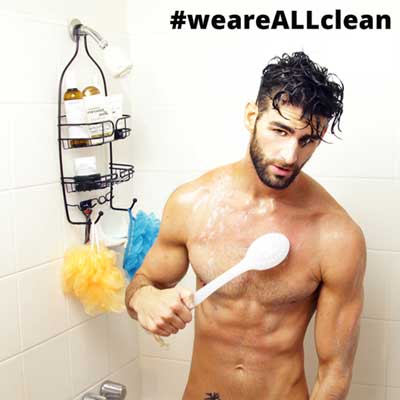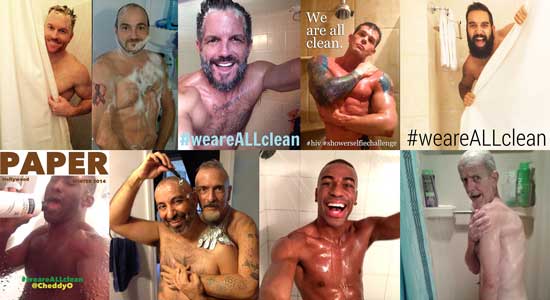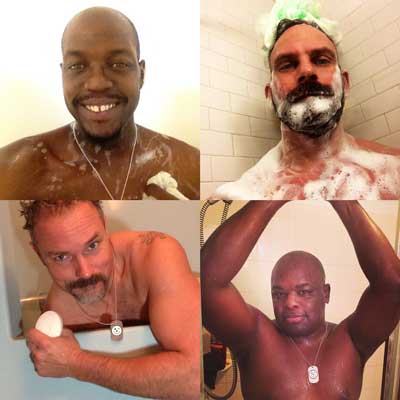If you're looking for HIV's answer to the ALS
Ice Bucket Challenge, which raised over US$100 million for the ALS
Association, Jack Mackenroth just may have it: the HIV Shower Selfie
Challenge. Mackenroth, a famous HIV-positive activist and prior
contestant on
Project Runway, has partnered with
Moovz,
a global gay social networking app, to launch the project. Playing to a
culture that loves a good selfie, Mackenroth is urging everyone to
fight HIV stigma by simply taking a
special kind of selfie.
 |
| Jack Mackenroth |
"I was inspired by the use of the word 'clean,' especially common in gay
culture, to describe oneself as STI/STD free. Indirectly this implies
that HIV-positive people are somehow 'dirty,'" says Mackenroth. "I
thought a PG or PG-13 shower selfie or Vine video would be a fun way
that everyone could easily show their support for finding a cure on
social media by using the hashtag #weareALLclean when they post their
photo with the link. They then nominate 3 other people to participate
and hopefully donate to the project as well."
Encouraged by the amount raised by the ALS Association during its Ice
Bucket Challenge, the goal of Mackenroth's selfie campaign is to raise
US$1 million to stop the epidemic and help find a cure. The U.S. Centers
for Disease Control and Prevention (CDC) estimates that there are
currently 1.2 million people in the U.S. living with HIV and over 35
million people living with HIV around the world. The campaign will be
ongoing indefinitely and all donations received will go to
Housing Works, a nonprofit organization fighting on the front lines to end HIV and homelessness in New York and around the world. You can
donate here.
"As someone who has been living with HIV for 25 years this is very
personal to me," said Mackenroth. He added, "There is current urgency
for funding as we have new treatments that maintain viral suppression
and render HIV-positive individuals virtually non-transmissible. Those
same treatments can be given to HIV-negative individuals and protect
them from infection. Essentially we already have the tools to stop the
epidemic from spreading. Exciting new research is bringing us closer to a
real cure for AIDS every day."
Housing Works' President and CEO Charles King added, "My hope is that
this campaign inspires conversation, action and a reinvigorated
commitment to end AIDS."
The campaign will launch via Moovz, which has a history of high
engagement with successful international LGBT social media campaigns.
Mackenroth is no stranger to social campaigns -- or to working with
Housing Works. His
fundraising campaign for BRAKING AIDS Ride earlier this year
raised eyebrows and blood pressures. He has enlisted a few "social
media superstars" to get this latest campaign off the ground.
 |
| Chris Salvatore |
Actor, model, singer and social media maven Chris Salvatore is helping
spread the word about the campaign in Los Angeles in collaboration with
Moovz, as well. "It's time to erase the stigma and unite as a global
community. Regardless of your gender or sexual identity -- no matter
what age, color, size or shape you are, you should be a part of this
project! Let's all be one loud, united voice in support of awareness,
education, treatment and research for a cure," said Salvatore. "And have
fun with it. Be funny, sexy or silly. Who doesn't want to see people in
the shower soaping up for a good cause?"
"I truly hope this campaign goes viral -- no pun intended," Mackenroth quipped.
The campaign is launching this year just prior to World AIDS Day.
The hope is that there will be traction in the following weeks.
Do you want to get involved? Here's how:
- Take a selfie or Vine video of yourself in the shower. No explicit nudity, please.
- Post your photo now on Moovs and all social media
platforms with the caption "Take HIV Shower Selfie Challenge raise $$
for AIDS Cure bit.ly/CUREAIDS #weareALLclean"
- Challenge three or more other people to participate!
- Donate! Please consider a small donation if you are able. Every penny counts!
- On (or before) World AIDS Day, Monday, Dec. 1, please change
all your social media profile pix to your shower selfie photo and spread
the word!
Mathew Rodriguez is the community editor for TheBody.com and TheBodyPRO.com.
Follow Mathew on Twitter: @mathewrodriguez.
Copyright © 2014 Remedy Health Media, LLC. All rights reserved.




